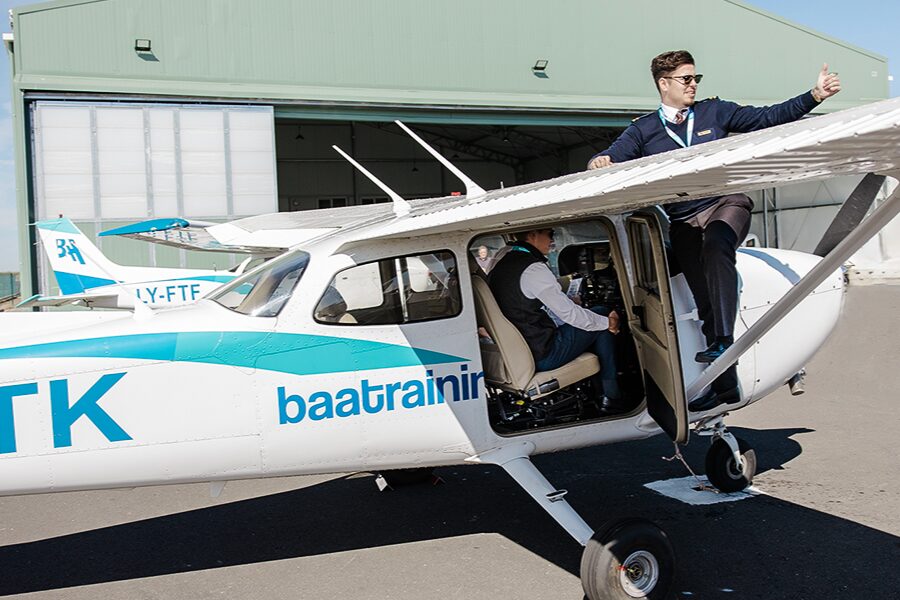The aviation industry faced a turbulent year in 2024, marked by not only technological innovation and ongoing sustainability demands but also major operational disruptions. Pilot training, one of the cornerstones of the industry, had to adapt to the challenges and opportunities accordingly. But what do these changes experienced in 2024 mean for the industry’s long-term readiness? How are training organizations and airlines adapting to keep pace?
Boeing and Airbus delivery delays: A silver lining for pilot training?
The aviation sector was hit hard by continued delays in aircraft deliveries from Boeing and Airbus, with delivery schedules running 30% below expected targets. According to IATA, the backlog for new aircraft has reached a record 17,000 planes, translating to an astounding 14-year wait at current production rates. The disruption of such scale has led airlines to rely heavily on dry and wet leasing instead, creating a ripple effect in pilot training programs.
“For airlines, delivery delays have thrown a wrench into long-term training plans,” said Martynas Mazeika, Chief Sales Officer at BAA Training, a leader in aviation training solutions. “The unpredictability makes it challenging for them to plan pilot training in line with operational needs. Investment in new training devices, too, remains uncertain, but outsourcing training on an as-needed basis has become the practical solution this year.”
Despite the challenges, some see this as an opportunity. The slowdown in Type Rating programs, Mazeika noted, opens doors for the initial pilot training, allowing airlines to prepare pilots who will be ready in around two years’ time, just as the first delayed aircraft arrive.
“However, we have to remember that aviation training is always 100% about people. Pilots aren’t a resource you can put on pause; their skills must stay sharp and ready for when operations begin, so training must align closely with that.”
Multi-crew pilot license programs gain momentum
The Multi-Crew Pilot License (MPL) continued to gain traction in 2024, offering a more streamlined pathway to the cockpit. Despite initial skepticism, MPL programs have been proving their value, with no known examples of airlines reverting to the traditional Commercial Pilot License (CPL) with Type Rating route after adopting MPL, explained Mazeika.
“A major driver behind MPL’s success is the shifting perception of the pilot profession. With the profession losing some of its prestige in recent years – we have to be fair here – airlines are competing to attract candidates through more innovative cadet programs. MPL offers a faster and more focused route, making it appealing to aspiring pilots and airlines alike.”
This shift could be pivotal in addressing pilot shortages, particularly as the industry continually seeks to recover from years of instability. While the question remains if MPL will become the global standard in the years to come, it seems that the new approach is on the way to becoming one.
Impact of AI and automation
Artificial intelligence and automation were also prominent advancements in 2024, starting to reshape pilot training methodologies. From AI-enhanced flight simulators to advanced cockpit automation systems, these technologies are slowly but surely revolutionizing how pilots are trained and what they focus on.
“AI allows flight simulators to make real-time adjustments based on pilot behavior, creating highly personalized training experiences,” shares Mazeika. “Meanwhile, cockpit automation is shifting the pilot’s role from hands-on flying to system management, requiring a stronger emphasis on situational awareness and decision-making skills.”
Looking ahead, AI’s potential in pilot training is vast, from predictive analytics to optimized training schedules to virtual instructors that can simulate complex scenarios. Mazeika hints that the integration of AI into pilot training isn’t just about keeping up with technology; it’s about staying ahead of the curve.
New challenge for training with Airbus A321XLR
The aviation industry’s commitment to sustainability saw the movement as well. A stronger focus on sustainable aviation fuels (SAFs) has ramped up global SAF production in 2024 and hit 1 million metric tons (around 1.3 billion liters), according to a report from IATA. This marked a near-double increase in output from the 0.5 million metric tons (600 million liters) produced in 2023. The introduction of eco-friendly aircraft, like the A321XLR, became a game-changer for the industry as well. The aircraft boasts 30% better fuel efficiency per passenger, but its unique operational profile poses fresh challenges for pilot training, notes Mazeika.
“The A321XLR blurs the line between medium-haul and long-haul flying. Pilots will need to adapt to its dual nature – operating short 40-minute flights and transatlantic routes lasting over seven hours, often on the same day.”
These shifts necessitate new training modules, including transatlantic crossing procedures and strategies for managing longer rest periods and remote layovers. The sustainability focus also means pilots must master fuel management techniques and adopt eco-friendly flying practices, aligning with the industry’s green goals.
Looking ahead to pilot training
It is clear that the challenges and innovations of the past year have left a mark on pilot training. From grappling with aircraft delivery delays to embracing AI and sustainability, the industry has shown resilience and adaptability in the face of uncertainty, as it did several years ago. These developments not only address immediate needs, but also lay the groundwork for the next generation of pilots and the future of aviation.
Looking ahead to 2025, one thing is certain: the evolution of pilot training will continue to be shaped by technological advancements, environmental priorities, and the ever-changing demands of the global aviation landscape.
